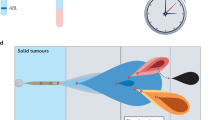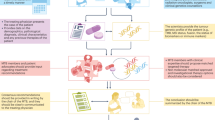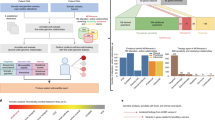Abstract
Personalized cancer therapy is based on the precept that detailed molecular characterization of the patient's tumour and its microenvironment will enable tailored therapies to improve outcomes and decrease toxicity. The goal of personalized therapy is to target aberrations that drive tumour growth and survival, by administering the right drug combination for the right person. This is becoming increasingly achievable with advances in high-throughput technologies to characterize tumours and the expanding repertoire of molecularly targeted therapies. However, there are numerous challenges that need to be surpassed before delivering on the promise of personalized cancer therapy. These include tumour heterogeneity and molecular evolution, costs and potential morbidity of biopsies, lack of effective drugs against most genomic aberrations, technical limitations of molecular tests, and reimbursement and regulatory hurdles. Critically, the 'hype' surrounding personalized cancer therapy must be tempered with realistic expectations, which, today, encompass increased survival times for only a portion of patients.
This is a preview of subscription content, access via your institution
Access options
Subscribe to this journal
Receive 12 print issues and online access
$209.00 per year
only $17.42 per issue
Buy this article
- Purchase on Springer Link
- Instant access to full article PDF
Prices may be subject to local taxes which are calculated during checkout


Similar content being viewed by others
References
Konigsberg, R. et al. Clinical and economic aspects of KRAS mutational status as predictor for epidermal growth factor receptor inhibitor therapy in metastatic colorectal cancer patients. Oncology 81, 359–364 (2011).
Blank, P. R., Moch, H., Szucs, T. D. & Schwenkglenks, M. KRAS and BRAF mutation analysis in metastatic colorectal cancer: a cost-effectiveness analysis from a Swiss perspective. Clin. Cancer Res. 17, 6338–6346 (2011).
Karapetis, C. S. et al. K-ras mutations and benefit from cetuximab in advanced colorectal cancer. N. Engl. J. Med. 359, 1757–1765 (2008).
Davies, H. et al. Mutations of the BRAF gene in human cancer. Nature 417, 949–954 (2002).
Chapman, P. B. et al. Improved survival with vemurafenib in melanoma with BRAF V600E mutation. N. Engl. J. Med. 364, 2507–2516 (2011).
Perou, C. M. et al. Molecular portraits of human breast tumours. Nature 406, 747–752 (2000).
Sørlie, T. et al. Gene expression patterns of breast carcinomas distinguish tumor subclasses with clinical implications. Proc. Natl Acad. Sci. USA 98, 10869–10874 (2001).
Al-Hajj, M., Wicha, M. S., Benito-Hernandez, A., Morrison, S. J. & Clarke, M. F. Prospective identification of tumorigenic breast cancer cells. Proc. Natl Acad. Sci. USA 100, 3983–3988, (2003).
Wicha, M. S., Liu, S. & Dontu, G. Cancer stem cells: an old idea--a paradigm shift. Cancer Res. 66, 1883–1890 (2006).
Fialkow, P. J. Clonal origin of human tumors. Annu. Rev. Med. 30, 135–143 (1979).
Wang, X. et al. Evidence for common clonal origin of multifocal lung cancers. J. Natl Cancer Inst. 101, 560–570 (2009).
Rabkin, C. S. et al. Monoclonal origin of multicentric Kaposi's sarcoma lesions. N. Engl. J. Med. 336, 988–993 (1997).
Yachida, S. et al. Distant metastasis occurs late during the genetic evolution of pancreatic cancer. Nature 467, 1114–1117 (2010).
Shah, S. P. et al. The clonal and mutational evolution spectrum of primary triple-negative breast cancers. Nature 486, 395–399 (2012).
Navin, N. et al. Tumour evolution inferred by single-cell sequencing. Nature 472, 90–94 (2011).
Gonzalez-Angulo, A. M. et al. PI3K pathway mutations and PTEN levels in primary and metastatic breast cancer. Mol. Cancer Ther. 10, 1093–1101 (2011).
Dupont Jensen, J. et al. PIK3CA mutations may be discordant between primary and corresponding metastatic disease in breast cancer. Clin. Cancer Res. 17, 667–677 (2011).
Gerlinger, M. et al. Intratumor heterogeneity and branched evolution revealed by multiregion sequencing. N. Engl. J. Med. 366, 883–892 (2012).
Liedtke, C. et al. Prognostic impact of discordance between triple-receptor measurements in primary and recurrent breast cancer. Ann. Oncol. 20, 1953–1958 (2009).
Niikura, N. et al. Loss of human epidermal growth factor receptor 2 (HER2) expression in metastatic sites of HER2-overexpressing primary breast tumors. J. Clin. Oncol. 30, 593–599 (2012).
Muranen, T. et al. Inhibition of PI3K/mTOR leads to adaptive resistance in matrix-attached cancer cells. Cancer Cell 21, 227–239 (2012).
Chandarlapaty, S. et al. AKT inhibition relieves feedback suppression of receptor tyrosine kinase expression and activity. Cancer Cell 19, 58–71 (2011).
Mittendorf, E. A. et al. Loss of HER2 amplification following trastuzumab-based neoadjuvant systemic therapy and survival outcomes. Clin. Cancer Res. 15, 7381–7388 (2009).
Pao, W. et al. Acquired resistance of lung adenocarcinomas to gefitinib or erlotinib is associated with a second mutation in the EGFR kinase domain. PLoS Med 2, e73 (2005).
Engelman, J. A. et al. MET amplification leads to gefitinib resistance in lung cancer by activating ERBB3 signaling. Science 316, 1039–1043 (2007).
Bean, J. et al. MET amplification occurs with or without T790M mutations in EGFR mutant lung tumors with acquired resistance to gefitinib or erlotinib. Proc. Natl Acad. Sci. USA 104, 20932–20937 (2007).
Turke, A. B. et al. Preexistence and clonal selection of MET amplification in EGFR mutant NSCLC. Cancer Cell 17, 77–88 (2010).
Sequist, L. V. et al. Genotypic and histological evolution of lung cancers acquiring resistance to EGFR inhibitors. Sci. Transl. Med. 3, 75ra26 (2011).
Wetterstrand, K. A. DNA sequencing costs. Data from the NHG RI Large-Scale Genome Sequencing Program [online], (2012).
Ross, J. S. & Cronin, M. Whole cancer genome sequencing by next-generation methods. Am. J. Clin. Pathol. 136, 527–539 (2011).
Maheswaran, S. et al. Detection of mutations in EGFR in circulating lung-cancer cells. N. Engl. J. Med. 359, 366–377 (2008).
Diel, F. et al. Detection and quantification of mutations in the plasma of patients with colorectal tumors. Proc. Natl Acad. Sci. USA 102, 16368–16373 (2005).
Board, R. E. et al. Detection of PIK3CA mutations in circulating free DNA in patients with breast cancer. Breast Cancer Res. Treat. 120, 461–467 (2010).
Board, R. E. et al. Detection of BRAF mutations in the tumour and serum of patients enrolled in the AZD6244 (ARRY-142886) advanced melanoma phase II study. Br. J. Cancer 101, 1724–1730 (2009).
Søndergaard, J. N. et al. Differential sensitivity of melanoma cell lines with BRAFV600E mutation to the specific Raf inhibitor PLX4032. J. Transl. Med. 8, 39 (2010).
Meric, F. et al. Expression profile of tyrosine kinases in breast cancer. Clin. Cancer Res. 8, 361–367 (2002).
Carter, P. et al. Humanization of an anti-p185HER2 antibody for human cancer therapy. Proc. Natl Acad. Sci. USA 89, 4285–4289 (1992).
Agus, D. B. et al. Targeting ligand-activated ErbB2 signaling inhibits breast and prostate tumor growth. Cancer Cell 2, 127–137 (2002).
Konecny, G. E. et al. Activity of the dual kinase inhibitor lapatinib (GW572016) against HER-2-overexpressing and trastuzumab-treated breast cancer cells. Cancer Res. 66, 1630–1639 (2006).
Mills, G. B. An emerging toolkit for targeted cancer therapies. Genome Res. 22, 177–182 (2012).
Iorns, E., Lord, C. J., Turner, N. & Ashworth, A. Utilizing RNA interference to enhance cancer drug discovery. Nat. Rev. Drug Discov. 6, 556–568 (2007).
Polyak, K. & Garber, J. Targeting the missing links for cancer therapy. Nat. Med. 17, 283–284 (2011).
Farmer, H. et al. Targeting the DNA repair defect in BRCA mutant cells as a therapeutic strategy. Nature 434, 917–921 (2005).
Paez, J. G. et al. EGFR mutations in lung cancer: correlation with clinical response to gefitinib therapy. Science 304, 1497–1500 (2004).
Goulart, B. H. et al. Trends in the use and role of biomarkers in phase I oncology trials. Clin. Cancer Res. 13, 6719–6726 (2007).
Banerji, U., de Bono, J., Judson, I., Kaye, S. & Workman, P. Biomarkers in early clinical trials: the committed and the skeptics. Clin. Cancer Res. 14, 2512; author reply 2513–2514 (2008).
Pusztai, L., Anderson, K. & Hess, K. R. Pharmacogenomic predictor discovery in phase II clinical trials for breast cancer. Clin. Cancer Res. 13, 6080–6086 (2007).
McShane, L. M., Hunsberger, S. & Adjei, A. A. Effective incorporation of biomarkers into phase II trials. Clin. Cancer Res. 15, 1898–1905 (2009).
Kim, E. S. et al. The BATTLE Trial: Personalizing therapy for lung cancer. Cancer Discov. 1, 44–53 (2011).
Irwig, L., Glasziou, P. & March, L. Ethics of n-of-1 trials. Lancet 345, 469 (1995).
Mahon, J., Laupacis, A., Donner, A. & Wood, T. Randomised study of n-of-1 trials versus standard practice. BMJ 312, 1069–1074 (1996).
Porta, M. S. The search for more clinically meaningful research designs: single-patient randomized clinical trials. J. Gen. Intern. Med. 1, 418–419 (1986).
Doroshow, J. H. Selecting systemic cancer therapy one patient at a time: is there a role for molecular profiling of individual patients with advanced solid tumors? J. Clin. Oncol. 28, 4869–4871 (2010).
Von Hoff, D. D. et al. Pilot study using molecular profiling of patients' tumors to find potential targets and select treatments for their refractory cancers. J. Clin. Oncol. 28, 4877–4883 (2010).
Olson, E. M., Lin, N. U., Krop, I. E. & Winer, E. P. The ethical use of mandatory research biopsies. Nat. Rev. Clin. Oncol. 8, 620–625 (2011).
El-Osta, H. et al. Outcomes of research biopsies in phase I clinical trials: the MD Anderson Cancer Center experience. Oncologist 16, 1292–1298 (2011).
MacConaill, L. E. et al. Profiling critical cancer gene mutations in clinical tumor samples. PLoS One 4, e7887 (2009).
Medvedev, P., Stanciu, M. & Brudno, M. Computational methods for discovering structural variation with next-generation sequencing. Nat. Methods 6, S13–S20 (2009).
Greenman, C. et al. Patterns of somatic mutation in human cancer genomes. Nature 446, 153–158 (2007).
Stratton, M. R., Campbell, P. J. & Futreal, P. A. The cancer genome. Nature 458, 719–724 (2009).
Kopetz, S. et al. PLX4032 in metastatic colorectal cancer patients with mutant BRAF tumors [abstract]. J. Clin. Oncol. 28 (Suppl. 15), a353415 (2010).
Lee, M. J. et al. Sequential application of anticancer drugs enhances cell death by rewiring apoptotic signaling networks. Cell 149, 780–794 (2012).
Gonzalez-Angulo, A. M., Hennessy, B. T. & Mills, G. B. Future of personalized medicine in oncology: a systems biology approach. J. Clin. Oncol. 28, 2777–2783 (2010).
Centers for Medicare & Medicaid Services. Clinical Laboratory Improvement Amendments (CLIA) [online], (2012).
US Food and Drug Administration. Recently-approved devices [online]. (2012).
Tibes, R. et al. Patient willingness to undergo pharmacodynamic and pharmacokinetic tests in early phase oncology trials. Cancer 117, 3276–3283 (2011).
Clayton, E. W. et al. Confronting real time ethical, legal, and social issues in the Electronic Medical Records and Genomics (eMERGE) Consortium. Genet. Med. 12, 616–620 (2010).
McGuire, A. L., Diaz, C. M., Wang, T. & Hilsenbeck, S. G. Social networkers' attitudes toward direct-to-consumer personal genome testing. Am. J. Bioeth. 9, 3–10 (2009).
Acknowledgements
We thank Ruth Haynes for assistance with the manuscript preparation.
Author information
Authors and Affiliations
Contributions
All authors made a substantial contribution to researching data for the article, discussing content, and writing and editing the manuscript prior to submission, and revising the article after peer review.
Corresponding author
Ethics declarations
Competing interests
G. B. Mills declares he is a consultant and he serves as a scientific advisor of Arcxis Biotechnologies, Asuragen, Catena Pharmaceuticals, Daiichi-Sankyo, Foundation Medicine, Komen Foundation, Novartis, Targeted Molecular Diagnostics LLC, Tau Therapeutics. He owns shares from Catena Pharmaceuticals, PTV Sciences. He receives grant support from Astrazeneca, Celgene, CeMines Inc, Exelisis, GlaxoSmithKline, Lpath Inc, Pfizer, Roche. F. Meric-Bernstam declares no competing interests.
Rights and permissions
About this article
Cite this article
Meric-Bernstam, F., Mills, G. Overcoming implementation challenges of personalized cancer therapy. Nat Rev Clin Oncol 9, 542–548 (2012). https://doi.org/10.1038/nrclinonc.2012.127
Published:
Issue Date:
DOI: https://doi.org/10.1038/nrclinonc.2012.127
This article is cited by
-
Clinical prospects of WRN inhibition as a treatment for MSI tumours
npj Precision Oncology (2022)
-
Recent advances on microneedle arrays-mediated technology in cancer diagnosis and therapy
Drug Delivery and Translational Research (2021)
-
Non-genetic mechanisms of therapeutic resistance in cancer
Nature Reviews Cancer (2020)
-
From a Patient Advocate’s Perspective: Does Cancer Immunotherapy Represent a Paradigm Shift?
Current Oncology Reports (2018)
-
A network modeling approach to elucidate drug resistance mechanisms and predict combinatorial drug treatments in breast cancer
Cancer Convergence (2017)



